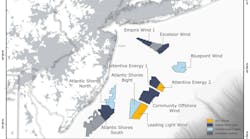Offshore staff
ABERDEEN, UK — Britain’s North Sea Transition Authority (NSTA) has published a new emissions reduction plan.
This calls for operators across the UK Continental Shelf to take action on flaring and venting and electrification of oil and gas installations.
The plan identifies four clear contributing factors that the NSTA said are needed to decarbonize the industry.
Although the UK sector has reduced offshore production emissions by nearly 25% since 2018, and almost halved flaring between 2018 to 2022, both still account for about 3% of the UK’s greenhouse-gas emissions.
Power generation accounted for 79% of production emissions in 2022. Under a best-case scenario, cleaner power (electrification) could save a further 1 MMmt to 2 MMmt in 2030, the NSTA said, and up to 22 MMmt by 2050.
Where the NSTA considers electrification reasonable, but not so far implemented, this could impact approval of future UK field development plans or tie-ins of future hydrocarbon resources to the offshore facility.
The NSTA will also consider other forms of low-carbon power if operators can provide evidence of near-equivalent emissions reduction. In cases where electrification of an existing asset is not feasible, it wants alternative low-carbon power emissions reductions strategies to be adopted.
The plan highlights other emission reduction routes: investment and efficiency, focusing on inventory as a whole, and action on flaring and venting.
The NSTA foresees increased scrutiny of assets with high emissions intensity and their cessation of production dates, but it acknowledges that to secure production while reducing emissions overall could involve trade-offs between installations. That could mean closing some low-producing, high-polluting installations earlier to allow higher producing and "cleaner" new facilities to come online.
As for actions needed to reduce flaring and venting, in the latter case focused on methane, the plan sets out a requirement that operators monitor and reduce fugitive emissions.
The NSTA will apply the plan in a reasonable manner, and it will not pursue actions that could bring about significant unintended consequences simply because of specific wording in the plan.
03.28.2024









